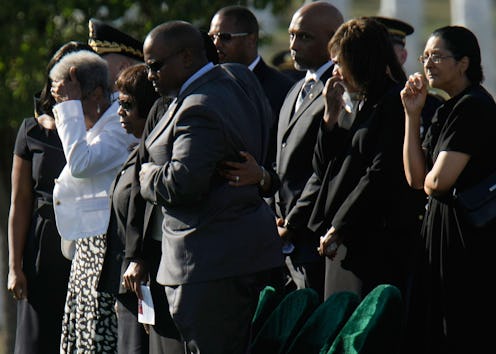News
82 Years Later, Scottsboro Boys Finally Pardoned
In 1931, the racially-segregated state of Alabama sentenced eight black teenagers to death after they were accused of raping two white women. Known as the Scottsboro Boys, the nine teenagers – the final, youngest boy was also convicted, but spared the death sentence — are known today as victims of a gross miscarriage of justice. On Thursday, Alabama's parole board voted in favor of granting full and unconditional pardons posthumously to three of the Scottsboro Boys: Haywood Patterson, Charlie Weems and Andy Wright. They were the only Scottsboro Boys left that hadn't been officially pardoned.
Thursday's decision was the result of a brand-new Alabama law that allows the parole board to determine posthumous pardons for convictions at least 75 years old. The law passed through the Alabama Legislature unanimously, and was created with the intent of pardoning the Scottsboro Boys. "It is a promising reminder of how far we have come from those regretful days in our past," said Alabama Sen. Arthur Orr.
In 1937, one of the two alleged rape victims recanted her accusations, so charges against five of the men were dropped. A sixth Scottsboro Boy, Clarence Norris, received a pardon in 1976, before he passed away. But it wasn’t until Thursday that the remaining three men saw their names cleared, since Alabama state law didn’t previously allow posthumous pardons.
Back in 1931, the boys were arrested after illegally traveling on a freight train to Memphis, Tenn. from Chattanooga. A number of whites had jumped off the train and told the local sheriff they were attacked by a group of blacks. This caused train officials to stop the train in Alabama, which is where authorities came across the two white girls who accused the nine black boys of rape.
"This decision will give them a final peace in their graves, wherever they are," said Sheila Washington, director of the Scottsboro Museum and Cultural Center in Scottsboro.
The decision is bittersweet: Alabama giving the Scottsboro Boys a “new ending” over 80 years after they were originally arrested is important for the boys' legacy, but it doesn’t change what the boys went through. None were ultimately executed by the state, but several served prison time, and the conviction remained on their historical records until Thursday.
And for some in Alabama, segregation isn't ancient history: in September, the University of Alabama’s student newspaper published an investigative article claiming that segregation is still highly prevalent in the school's Greek sorority chapters. Bustle reported:
At least one girl, they said, was rejected by sororities across the board this fall on grounds of being a black woman — which, according to the chapters, was a threat to their “traditions” and “policies.” The article went viral, and commentators nationwide slated the college, prompting its president to instruct sororities to “remove barriers in order to increase diversity in our sororities.” Which is a fancy way of saying stop being racist.
Last week, one of the majority-white sororities at the University of Alabama elected an African-American president for the very first time. According to WBRC-TV, 22-year-old Hannah Patterson is now the president of Sigma Delta Tau.
